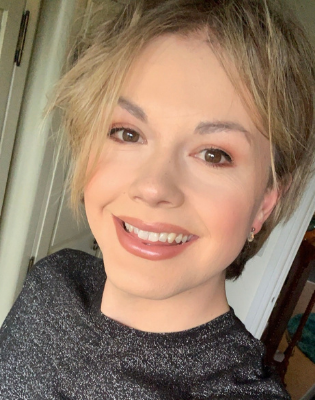Simon Clewes – PhD English Literature
Midlands4Cities funded English Literature PhD student Simon Clewes returned to academia after working as a journalist. We found out more about their experience as a researcher at the University of Birmingham.
 Why did you choose to study for a PhD in English Literature?
Why did you choose to study for a PhD in English Literature?
It was a very welcome chance to develop a project I started back in 2012 during my undergraduate degree at Keele University. Initially, I was researching male-male desire in the novels of William Godwin and his circle. My project has now grown to have a much broader focus on queerness and transness in Romanticism. I’d previously spent a few years out of academia working as a journalist, so it was wonderful to return, get back to working on something I still had much to say (and learn!) about, and become part of a wonderful research community. I was also fortunate to receive full funding from the Midlands4Cities (AHRC) Doctoral Training Partnership, which been fantastic and a huge support.
Why did you choose to undertake research at the University of Birmingham?
I love the University! My first experience studying here was in 2015-2016 when I completed an MRes in Sexuality and Gender Studies (which I believe was the first of its kind in the UK and was a huge draw for me to study here). The quality of teaching and research is excellent, hugely beneficial to my own research project and interests, and I felt completely supported both professionally and personally. A year studying here certainly wasn’t long enough, so I decided to come back to undertake my PhD. My supervisory team has been a joy to work with, and the University has fantastic library and archival resources. And obviously the campus is gorgeous (and the train station comes in very handy!)
What are the best things about your course?
Many things, but I would have to say my supervisory team has been one of the biggest highlights of my PhD experience. I’ve been lucky enough to work with supervisors specialising in Romantic, earlier eighteenth century and later nineteenth century literature, as well as queer theory and transgender studies, which means I’ve received invaluable guidance and feedback on my research across numerous areas. I really feel like I’m part of a community at Birmingham, which is so important to balance the sense of isolation you can sometimes feel when working on a PhD. It’s truly been a joy to study here.
What is life like as a researcher at the University of Birmingham?
It’s brilliant. Due to Covid-19, I only had a year and a half studying in-person prior to March 2020. Throughout lockdown, though, I felt totally supported by the university. We were always kept in the know about the range of opportunities available to us, from training, workshops, and information sessions, to funding opportunities and chances to present or publish our work. I am certainly enjoying returning to campus now restrictions have eased!
What support have you received during your PhD?
The majority of the support I have received has been from my brilliant supervisory team and my funding sponsor, M4C. Knowing that help and advice is only a quick email away is such a reassurance, as PhD life can often feel like a juggling act trying to keep on top of and across everything. I also appreciate that the university keeps in regular touch about mental health and wellbeing access, as these services are of such importance.
Outside of your research, what experience have you gained and how will it help you in the future?
Outside of working on my thesis, I have presented my research at numerous conferences, which was initially daunting but ultimately so rewarding. I have been fortunate enough to have had my work published in a journal, and this year I co-organised a conference and will be co-editing a special issue. Presenting your research—getting your work ‘out there’, so to say—is hugely beneficial, as feedback and support from a specialist audience and readers has helped me so much in developing my own research project and my confidence.
M4C have also organised numerous training and workshop events, many of which have helped us to see how our work and PhDs can lead to careers both within and outside of academia. I’d love to take my research further post-PhD, but it is also important to be aware of potential alternative career paths, so all these opportunities have been extremely useful.
Is there anything about studying for a PhD that you know now, but wish you had known before you started?
My advice to anyone starting a PhD is to be open to all the opportunities that will come your way, but also be selective and be mindful of your workload. It’s all too easy to feel guilty that you’re not doing enough, or that there is always more that you could or should be doing, but prioritising your own health and wellbeing is number one. And try to ignore the imposter syndrome as much as you can—everyone goes through it at some point, so just push through and believe in yourself!
Find out more about our PhD English Literature programme over on our course pages.